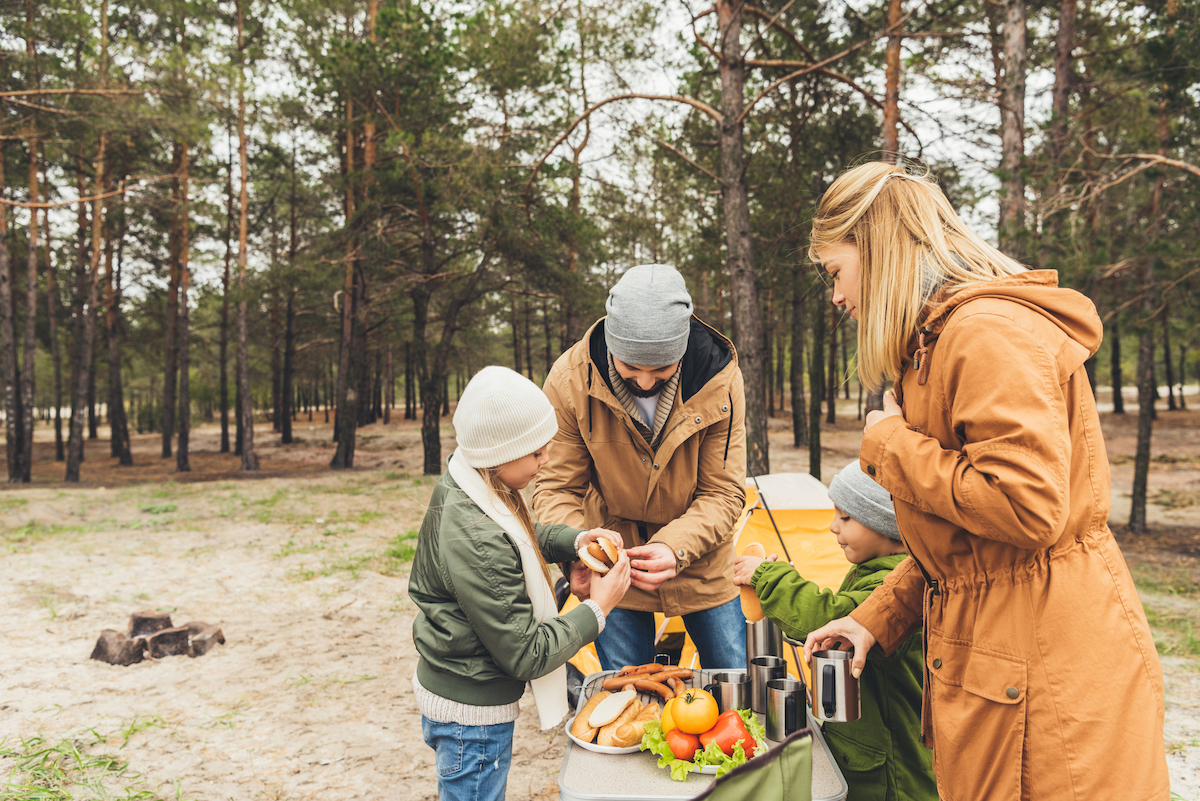- BY Susan Tucker
- POSTED IN Gluten-Free Life
- WITH 0 COMMENTS
- PERMALINK
- STANDARD POST TYPE

As the weather shifts to longer, warmer days, we can’t help but start planning for fun activities that will be ultimate outdoor enjoyment. One such activity is CAMPING! It’s hard to avoid fun in the sun when the weather is warm and nature is at its finest, from one of our wonderful national or state parks, or anywhere else your family likes to pitch a tent (or pull an RV). When camping is calling to your family, you can hardly resist. But when you have someone in your family with celiac disease, everything is more complicated. Even getting away from everyday life and trying to uncomplicate things for a few days.
Celiac Friendly Camping Ideas
Here are some ideas to help you prepare for the camping trip so everyone will enjoy it.
Pack the Regulars
Camping trips are usually made up of foods that are easy to prepare. You might throw in sandwiches, canned soups, cereal, trail mix, other snacks, and, of course, s’mores. The good news is that all of those regular camping items can be prepared in a gluten-free manner. You’re probably used to doing things gluten-free as it is so it’s not that much harder to go camping than it is to take any other trip. Anything you can prepare at home that you might take on a picnic, you can find in a gluten-free version.
Eat Perishables First
If you take perishable foods with you, make sure you eat them first so they don’t go bad. If you’re out in the woods for too many nights, their shelf life might expire and you don’t want to make anyone sick, especially the person with celiac disease.
YOU MAY ALSO ENJOY: Your Perfect Road Trip Meal! Classic Club Sandwich Recipe (Gluten Free Version)
Freeze & Dine
Depending on how many days you plan to be off the grid, you may also consider prepping and freezing dinners that you can pull out and cook each night. A few prepped dinner ideas would include meat and veggies, chili, campground paella, and many others.
Pro Tip: Set up coolers for specific needs, a “freezer” cooler would be packed with dry ice and prepared meals layered by days; an everyday use cooler would have a smaller bit of dry ice with ice cubes and a drink cooler would simply have ice cubes.
Pack Your Own Grill
While eating gluten is obviously going to bother someone with celiac disease, eating something gluten-free that has been grilled on a grill that has prepared items with gluten in them can be just as bad. This cross-contamination is very important to avoid and it can seem impossible when camping. All you have to do to be extra careful is to pack your own grill. You can get a small camping grill that runs on propane or coals and take it with you to keep food away from gluten contamination during your trip.
RELATED: Our Tips For Avoiding Gluten Cross Contamination
Don’t Veer Off The Edge
It’s important for someone with celiac disease to remain consistent. They generally know what bothers them and what they can get away with. Treat the food while they are camping like any other day. There might be special treats along the way, but on a regular basis, it’s best to take the things they are used to eating and keep things as normal and consistent as possible for them. They will enjoy the camping trip more and have more energy if they have the foods they are used to eating and can tolerate well.
Camping is a way to get away from it all and sometimes, someone with celiac disease wants to do that more than anyone else. Plan ahead and pack food smart and anyone, even those with gluten allergies and sensitivities, can thoroughly enjoy the camping experience!
TIP: Gluten Free Snackers are a quick, easy snack you can pack for your camping trip! Eat them right out of the bag, or use them as substitutes in your favorite dishes – like s’mores (the Honey Graham flavor is the perfect replacement for traditional graham crackers). Pick up a 4 or 8 pack when you click the image below.
Disclaimer: This information is not intended to treat, diagnose, cure or prevent any disease. All material provided on this Site is provided for information purposes only. Always seek the advice of your physician or other qualified health care provider with any questions you have regarding a medical condition, before undertaking any diet, exercise, other health program, or other procedure set out on this Site.


